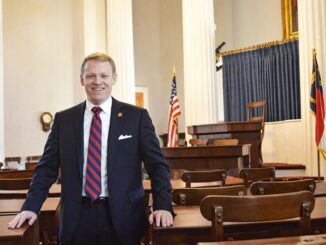
RALEIGH — A bill filed in the House of the General Assembly would authorize the state treasurer to include qualifying digital assets, including cryptocurrencies, virtual currencies, stablecoins and NFTs, in state investments such as the retirement system, pension funds and education-related funds.
If this authorization were signed into law, it would also apply to the General Fund and Highway Funds, and North Carolina Would join more than a dozen other states with “crypto-friendly” laws.
House Bill 92, titled “NC Digital Assets Investments Act,” was introduced by North Carolina Speaker of the House Destin Hall (R-Granite Falls) and Reps. Stephen Ross (R-Alamance), Mark Brody (R-Union) and Mike Schietzelt (R-Wake).
“We are seeing a rapid shift towards embracing blockchain technology and digital assets across the United States,” Hall said in a press release. “Investing in digital assets like Bitcoin not only has the potential to generate positive yields for our state investment fund but also positions North Carolina as a leader in technological adoption & innovation.
“I am proud to sponsor this bill. And I thank my colleagues Representatives Ross and Brody for their work in previous sessions to set the stage for this bill now in 2025.”
The bill sets strict parameters for these investments, limiting them to exchange-traded products with a minimum 12-month average market capitalization of $750 billion. Investments in digital assets are capped at 10% of the fund’s balance at the time of investment.
Additionally, the bill would require the use of secure custody solutions for internally managed digital assets, with specific security requirements including encrypted environments, geographically diverse secure data centers and regular security audits.
“The North Carolina Blockchain Initiative (NCBI) applauds Speaker Hall, Representative Ross, and their staff for their thoughtful engagement in advancing the NC Digital Assets Investments Act,” said Dan Spuller, head of industry affairs at the Washington-based Blockchain Association and co-chair of the NCBI task force.
“North Carolina has led on digital asset policy, from the updated Money Transmitters Act of 2016 to the bipartisan Regulatory Sandbox Act of 2021 and last year’s HB 690, which prohibited Central Bank Digital Currencies,” Spuller said. “Passing HB 92 will further cement the state’s leadership in financial and technological innovation.”
Loretta Boniti, director of strategic communications and media relations for State Treasurer Brett Briner, told North State Journal in an email that the treasurer is still reviewing the bill.
“We appreciate the legislature’s focus on finding new and forward-thinking ways to improve the performance on our pension plan and look forward to reviewing the bill,” Boniti said. “There are many compelling innovations happening in digital assets and it is important our state explore opportunities to modernize.
“Treasurer Brad Briner has previously expressed his concerns with investment performance which ranks North Carolina 49th or 50th in the nation, and we look forward to working with the legislature to improve the performance of the pension plan in a comprehensive manner.”



